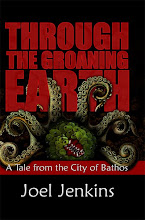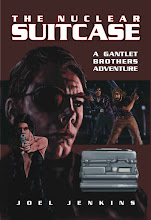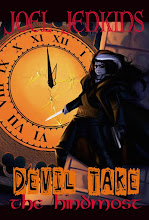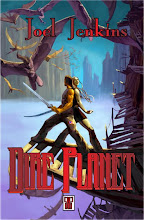 To the left is the cover of the upcoming Dark Worlds #3, which includes a story called Immortals of the Cannibal Coast--a piratical fantasy tale co-written by me and Martin Edward Stephenson.
To the left is the cover of the upcoming Dark Worlds #3, which includes a story called Immortals of the Cannibal Coast--a piratical fantasy tale co-written by me and Martin Edward Stephenson.Years ago I came across a couple of short stories he wrote at a website called Pulp and Dagger: Storm in a Jewel and Temple of the Mandricanth. Both were written in the present tense, which I find a bit awkward--but once I got past this I found the main characters, Rozak and Tarajel, quite engaging and Stephenson's use of language vivid and colorful.
After contacting Stephenson I discovered that he had a novel length manuscript featuring Rozak, and he asked me to read it and make some editing suggestions. In addition to the aforementioned qualities, I found that the fantasy milieu (one I named Immergoth when co-writing Immortals of the Cannibal Coast) that Stephenson uses borrowed a styling from Greek mythology that I found quite intriguing.
In Greek mythology the gods are always meddling with mortals for their own mostly selfish purposes-- for good or ill, but mostly ill. In Stephenson's milieu powerful immortals, gods and demi-gods, spend a lot of time meddling in mortal affairs. Immergoth is their sandbox to play in and the weakling mortals are their play pieces.
So when the opportunity arose to co-write a story with Martin Stephenson (I can't remember if he suggested it or if I suggested it) I leaped at the chance. We made Tarajel the protagonist and started the tale as her pirate ship was being blown onto the reefs of the Cannibal Coast with bloodthirsty nagas swimming in the surf--and let things get worse from there.
I hope to revisit Immergoth or a similar land some time, perhaps with a different character, just to see if he or she is able to handle the meddling of the demi-gods with the aplomb that Tarajel does in Immortals of the Cannibal Coast.
As soon as Dark Worlds #3 is available I'll let you know.




.jpg)
.JPG)






















